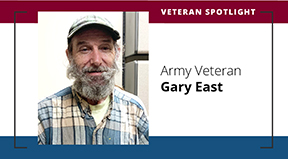Gary East did not have a good impression of VA. When he returned from six years as an Army radio and computer mechanic, he found it didn’t offer him adequate support for the transition to civilian life.
East’s impression was formed in 1988, the same year the Department of Veterans Affairs Act was signed, but one year before the transformational legislation went into effect. With this act, President Ronald Regan declared VA a cabinet-level department, which expanded its authority to provide greater benefits to Veterans from the federal level.

East, on the other hand, was in a different place – his home state of Ohio, where he would experience homelessness intermittently for the next 34 years.
A son’s request: Give VA a second chance
East became a skilled survivalist. He learned where to take shelter on the Ohio riverbank and how to trade scrap metal for food and necessities. Though he sometimes stayed with friends and family, he valued his independence. After a few weeks of their hospitality, he always insisted on returning to his routine.
East’s son had encouraged him to seek VA help for years. Still, East rejected the notion, remembering his first encounters. Finally, in January 2021, a cumulation of challenges introduced by the COVID-19 pandemic drove him to reconsider.
His son made the first call to the Cincinnati VA Medical Center where staff outlined the services available to Veterans experiencing homelessness. He relayed this to his father, urging him to explore a system that seemed genuinely determined to help. Finally, East agreed to visit VA with his son, but he didn’t make any promises.
Fully furnished apartment he’s happy to call home
Almost immediately, VA connected East with housing through its Grant and Per-Diem program with Volunteers of America, a nonprofit that has served vulnerable Americans for more than 123 years. Six months later, VA located and fully furnished an apartment for him. It’s a place he is happy to call home today.
VA’s ability to provide East with the various resources he needed to transition to safe and permanent housing was made possible through the Johnny Isakson and David P. Roe Veterans Health Care and Benefits Improvement Act of 2020. Section 4201 of this act authorizes VA to use appropriated funds for homeless Veterans and those enrolled in the Housing and Urban Development-VA Supportive Housing (HUD-VASH) program throughout the COVID-19 public health emergency.
This legislation has been paramount in providing Veterans experiencing homelessness with life-saving services. East reflects on the funding’s impact, saying, “I have a warm, dry place to sleep that doesn’t move around. I can manage.”
East values his weekly visit with his HUD-VASH caseworker, Seerat Bahniwal, whom he acknowledges as essential in helping him maintain his independence. Bahniwal uses Section 4201 as a tool to prevent East and other Veterans in the area from experiencing hunger.
VA’s help over the last year has encouraged East to explore other benefits he has earned. And while he is eager to continue receiving services through VA, his sights are set far beyond his own care.
“Go to VA. There is a program for you.”
A year ago, if East had known he soon would have his own apartment filled with a steady supply of nutritious food, he may not have believed it. If he had heard such changes were introduced by VA, he definitely wouldn’t have believed it. As he reflects on his improved circumstances, he reminds us that with the right support, anything is possible. That’s a truth for individuals and organizations alike.
East hopes other Veterans will follow his example.
“Go to VA. I’m telling you, there is a program for you,” East said. He feels a responsibility to guide his peers experiencing similar hardships to the same outcomes. “I’m going to help Veterans,” he said.
VA is working tirelessly to ensure no individual who has served their country is without a home. We could not agree with East more: It takes all of us to end Veteran homelessness.
Learn about VA programs
- Read more about how the 4201 authority helps VA provide flexible assistance to homeless Veterans.
- Read more about the HUD-VASH program to determine if you are eligible to receive rental assistance.
- Veterans who are homeless or at risk for homelessness should contact the National Call Center for Homeless Veterans at 877-4AID-VET (877-424-3838).
- Visit the VA Homeless Programs website to learn about housing initiatives and other programs for Veterans exiting homelessness.
- For more stories like these, visit the HPO website and subscribe to the Homeless Programs Office newsletter to receive monthly updates about programs and supportive services for Veterans experiencing or at risk of homelessness.
Topics in this story
More Stories
The Medical Foster Home program offers Veterans an alternative to nursing homes.
Watch the Under Secretary for Health and a panel of experts discuss VA Health Connect tele-emergency care.
The 2024 National Veteran Suicide Prevention Annual Report provides the foundation for VA’s suicide prevention programs and initiatives.







I can only answer for my own experience, but I am incredibly happy with the VA. Three years ago, I was increasingly losing my sight and was having various issues with balance, vision, hearing and diabetes. I took my wife and son’s advice and went to the VA to see what help was available, since I lost medical insurance after being laid off. I was quickly diagnosed with Parkinson’s disease and declared legally blind due to diabetic problems. Today, I’m being treated for Parkinson’s and PTSD, I’ve been treated for diabetic retinopathy, kidney disease, had hernia surgery and intraocular implants. And hearing aids. I can see better now than I have in years, and am being constantly monitored in every health category. I’ve had first-class treatment in both San Antonio and in New Orleans. I have heard many bad things about the VA over the years – and I’m sure many of them have been true. But I also believe much of that is people remembering past problems, and they’re failing to investigate what’s going on today. You owe it to yourself to look into what’s available.
Sadly this more horrendous Than You Can Imagen.
As a Vietnam Navy combat Veterian from the U.S.S FRANK E. EVANS D.D. 754 – During our deployment in 1966 , Thanks to the V.A . officials I am still not a combat Veterian .
With 55 years of the government’s own paperwork ( Former Senator Bill Nelson’s staff ) obtained for me , as did the serivor’s * Mr. Steve Kraus -ships Secretary. obtain IBM CARD & SHIPS LOG PAGES .
This in hand , they say I waited too long ?
I became a Veterian in 2012 by calling the suicide crisis hotline in March of that year near my birthday… 2 Weeks later , then , told to drive to Daytona Beach , Florida for an interview .
I became a Veterian / but they stated * [WE JUST DO NOT WHERE YOU WERE DURING THE VIETNAM POLICE ACTION ]
NEVER GIVE UP AND HELP OTHER Veterans Along The Way.
“VA is working tirelessly to ensure no individual who has served their country is without a home. We could not agree with East more: It takes all of us to end Veteran homelessness.”
I couldn’t disagree more with the above quote. I’m a retired Colonel and I have had to fight “tooth and nail” to get anything from the VA. The first answer is almost always “NO” in hope the vet will go away. As an example, it took me over two years to get an ortho appointment to treat a severe case of plantar fasciitis. It took me over six years to get my disability increased from 10% to 80% as my health continue to deteriorate. I still haven’t received any compensation for my left knee pain which is every bit as bad as my right knee. I keep being told since there is nothing in my medical records regarding my left knee, it’s not considered service connected. I guess the VA “wizards” think I marched, walked, ran, patrolled, etc on one leg. Lastly, the VA has refused to give my son any assistance claiming since his General Discharge was an OTH he isn’t eligible. He’s still a veteran. He served over 20 years on active duty and with the national guard including 5 short tours, four of them combat tours.
“VA is working tirelessly to ensure no individual who has served their country is without a home. We could not agree with East more: It takes all of us to end Veteran homelessness.”
I couldn’t disagree more with the above quote. I’m a retired Colonel and I have had to fight “tooth and nail” to get anything from the VA. The first answer is almost always “NO” in hope the vet will go away. As an example, it took me over two years to get an ortho appointment to treat a severe case of plantar fasciitis. It took me over six years to get my disability increased from 10% to 80% as my health continue to deteriorate. I still haven’t received any compensation for my left knee pain which is every bit as bad as my right knee. I keep being told since there is nothing in my medical records regarding my left knee, it’s not considered service connected. I guess the VA “wizards” think I marched, walked, ran, patrolled, etc on one leg. Lastly, the VA has refused to give my son any assistance claiming since his General Discharge was an OTH he isn’t eligible. He’s still a veteran.